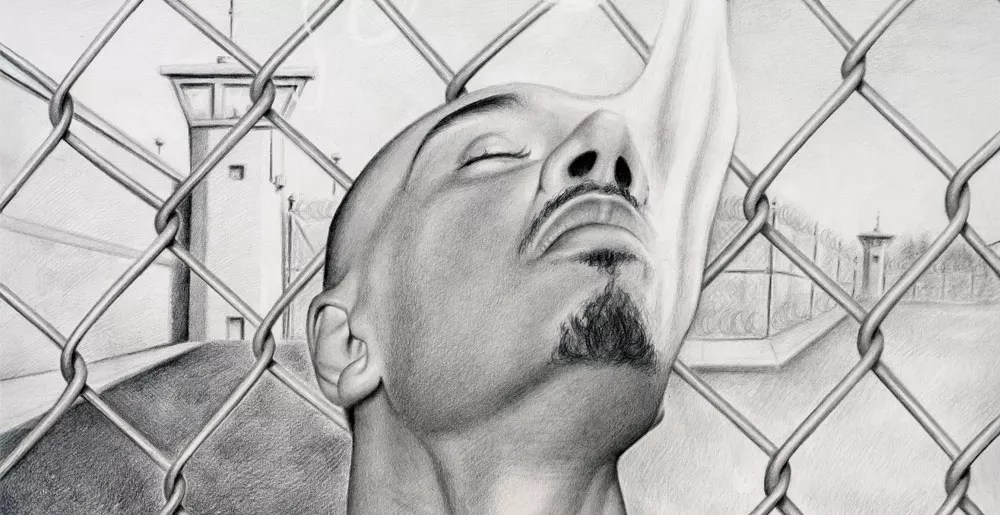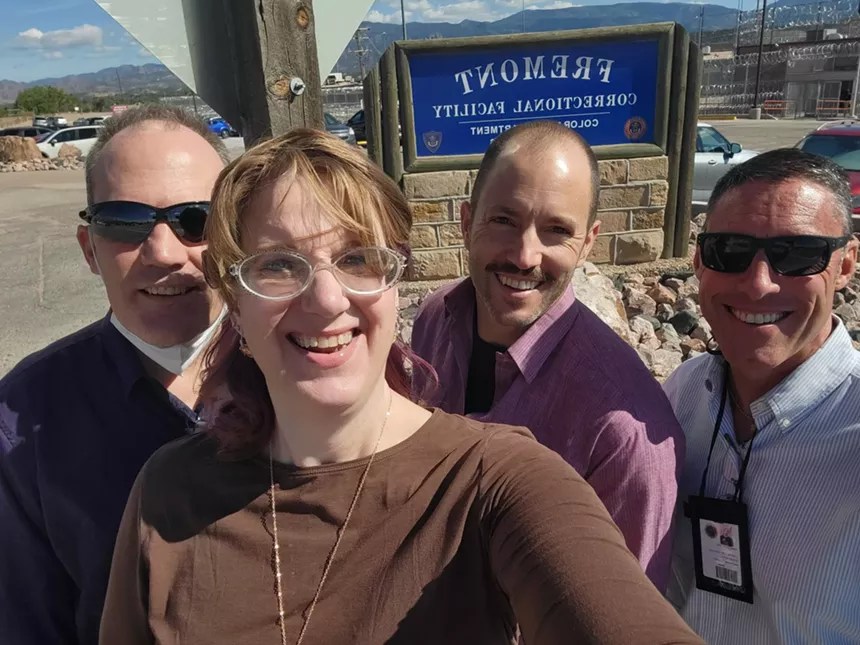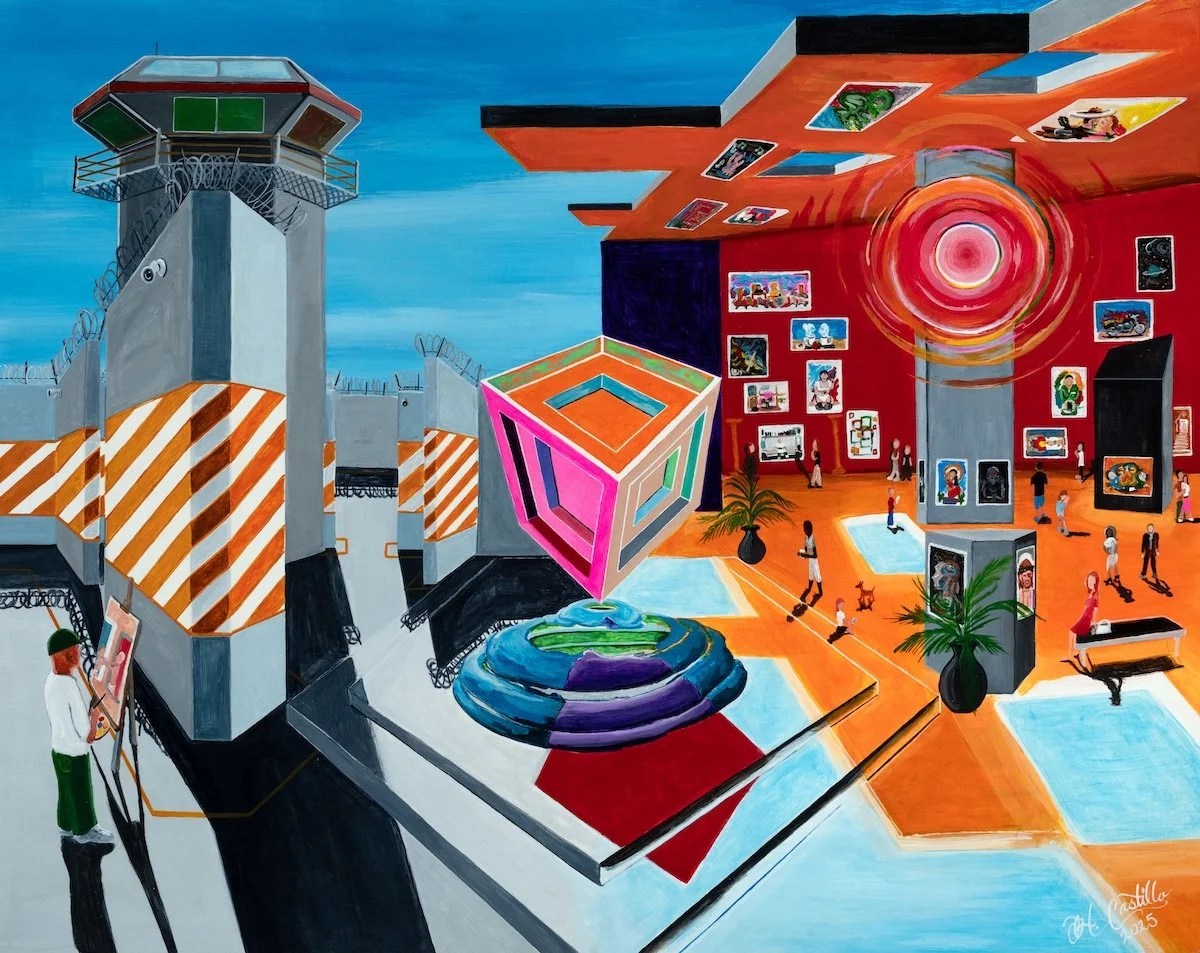
Sean Marshall

Audio By Carbonatix
JoyBelle Phelan believes that no one should be reduced to their worst moment. Phelan’s own story is her best proof of the importance of that fierce belief: Her worst moments led to her incarceration – but that incarceration in turn led to the work she’s proud to do now, on the outside.
Phelan is executive director of Unbound Authors, a nonprofit founded to “provide opportunities for incarcerated writers to imagine themselves as storytellers and sources of authentic knowledge,” according to its website. In order to push that program into the mainstream, Unbound Authors is creating a network of schools and other nonprofits that support system-impacted writers not just in Colorado, but beyond the state’s borders.
Phelan became involved with similar programs organized by the University of Denver’s Prison Arts Initiative (DU PAI) during her seven-year incarceration at the La Vista Correctional Facility in Pueblo for embezzlement. “The very first class that came to La Vista was one called ‘Writing the Breath,'” recalls Phelan. “It was a writing and meditation thing. Every week, we’d learn a new breathing technique along with some sort of a writing prompt. And then your homework over that next week was to practice your breathing exercise, and write something – a poem, part of a story, something. It was so cool.”
At the end of twelve weeks, the instructor gave each participant a copy of a collection of the class’s work. “It was a ‘zine, essentially,” Phelan says, and smiles. “So we were all of a sudden published authors, right? For me, it was the first time that I’d been celebrated for my writing. That was incredible.”
Fostering that feeling is exactly what the Prison Arts Initiative was designed to do when three academics, including Ashley Hamilton, who became the director, founded the program at DU in 2017. It quickly attracted other talented local creatives who wanted to improve the quality of life for incarcerated individuals through artistic expression.
Working under a contract with the Colorado Department of Corrections, DU PAI projects gave prisoners the opportunity to set an explicit goal – creating a poem, participating in a play, recording a story about their past – and make positive changes in their lives, whether or not they were ever released.
But then a sudden split sent many of those programs into solitary.

JoyBelle Phelan with DU PAI pals John Moore (from left), Ryan Conarro and Eric Davis.
Unbound Authors
In 2021, in the middle of the pandemic, DU PAI and the CDOC collaborated on a prison radio program known as Inside Wire. The programming was created by prisoners, but while Inside Wire’s primary focus was serving incarcerated listeners – beaming music, stories, information and other entertainment into prisons across Colorado – it also reached an outside audience through internet broadcasting. It was the first and only radio station in the country, perhaps the world, broadcasting 24/7 from inside prisons to the public at large.
Ryan Conarro, an outsider who served as general manager and program director of Inside Wire, came to the prison radio station by way of journalism. “I had the same moral assessment of people in the system: that people must in some way deserve being there. That it was the result of a personal failing instead of a systemic issue,” he says, shaking his head. “But my first job out of college was with a community radio station as a features reporter, and at that time I started doing some volunteer work at a local youth detention facility. That was my first exposure to the system.
“I came to understand that there were a lot of reasons people were in there. And some of them are very unfair,” he continues. “Or sometimes, the reason they’re there has some merit within the system, but the duration of their detention is an issue. And meanwhile, lives and development and change and relationships are happening inside these places that too often we think about as frozen in time, that are separate from reality. They’re not.”
That experience made Conarro an ideal person to help pioneer prison radio. “Inside Wire was the first of its kind, at least in the U.S.,” he says. “It was the first 24/7 radio station by incarcerated people that was also listenable to by the public. It was also the first that had radio access for everyone in the state system. So it was really new in terms of not only who was creating it, but also who was able to enjoy it. We really wanted to continue down that path.”
But instead, the plug was pulled in the summer of 2023, when the CDOC did not renew DU PAI’s contract.
Neither the CDOC nor DU are willing to go into details about what led to the break. DU has declined numerous requests to elaborate, and while CDOC Director of Communications Alondra Gonzales confirms the contract was not renewed, she adds that “we are not interested in doing an interview, obviously, at this time.”
In 2022, Dean Williams had stepped down as CDOC executive director, following four years of service that were very supportive of arts initiatives behind prison walls.
“The guy is utterly brilliant,” Karen Lausa said in 2021, when her nonprofit program Words Behind Bars – a book club for prisoners – was folded into DU PAI. “He’s done more to raise the bar on education programming and opportunities in his short tenure than I can even describe. The culture that I met face to face ten years ago and the one that exists now? There’s no comparison.”
Williams was replaced by Moses “Andre” Stancil. A few months later, the DU PAI contract was not renewed for a fifth year, in a decision that was “mutual between the two parties,” according to Gonzales.
Soon after, DU’s Hamilton left to take another position, “a really incredible new opportunity that allowed me to move back to New York City,” she says. That opportunity was becoming executive director of Adelphi University’s Can Art Change the World? Foundation, a position she still holds.
“I couldn’t be more proud of the work we accomplished with DU PAI over those years,” says Hamilton. “It’s so hard for me to choose just one project that I am most proud of – so much amazing work was created with our students behind the walls, and our team outside. But I think it would be If Light Closed Its Eyes, the interview-based play and film which we created with over 100 incarcerated artists, over the course of four years at Sterling Correctional Facility.”
JoyBelle Phelan was released from Community Corrections in December 2020. “It was the height of COVID, but I hit the ground running,” she says. “I was determined to make a difference.” One of the women she’d worked with at La Vista had put her in touch with Hamilton, and the result was a part-time job with DU PAI. She was also working with the Chicago-based Prison Journalism Project, which is creating a national network of prison journalists, and that gig had turned into full-time work by 2022; she left DU PAI before the CDOC did not renew its contract.
“But I really missed going inside [the prison environment] and working directly with the people there,” Phelan recalls. She shared that feeling with DU instructor Libby Catchings, and found that Catchings felt the same. After a lot of discussion and plenty of paperwork filed with the CDOC, Phelan and Catchings founded Unbound Authors in 2023.
While creating prison programs like those that originally inspired Phelan is still a goal, Unbound Authors initially focused on being a strong and effective “writing center within a prison,” she says. “So people can work on anything. If they’re in GED or college classes, they can get help with that. Or we have prompts to get them started, if they want it. We’re there to give them both resources and feedback.”
Recently, though, Unbound Authors was awarded a CDOC contract to revive some former DU PAI-related programs. “Originally, the state had two publications: the Inside Report, which was a newspaper; and Reverberations, which was a creative writing magazine,” explains Phelan. “Those have both been dark for two years. But as of this fiscal year, the DOC is entering into a new contract with Unbound Authors to relaunch both the newspaper and creative arts magazine, plus an annual anthology and online publication. I don’t know how we’re going to do all that, but we’re going to do it!”
Conarro is also enjoying a reboot as the co-director in charge of programs and partnerships for Colorado Radio for Justice. Like Inside Wire, CRJ seeks to serve those impacted by the criminal-legal system in Colorado and beyond with “innovative 24/7 media, beaming music, stories, news, and entertainment that amplifies diverse voices, lived experiences, and creative spirits,” according to an announcement from the program.
Conarro teamed up with Herbert Alexander (production and training) and Seth Ready (production and community programming) to jump-start the new prison radio program. Both Alexander and Ready had gotten their radio experience through Inside Wire while they were incarcerated, then they continued to work for it once they got out. The DU PAI and CDOC separation was “unexpected and surprising,” Conarro says, but once it occurred, the three got together and started brainstorming.
They wanted to add a new focus: programming to aid inmate re-entry into a non-incarcerated environment. “There were a lot of great prison radio programs doing a lot of great work, but we considered that re-launching the project with that focus in mind would be another way for the initiative to break new ground,” Conarro says. “This new framework will impact people all along the spectrum of system impact. Not just the currently incarcerated, but also those experiencing re-entry, and also organizations that are working to keep people out of the system.”
But it took more than a year before Colorado Radio for Justice finally got on the air. “We relaunched officially on April 15 of this year,” says Conarro. “We’re now back to broadcasting 24/7 again, and our original narrative audio – our interview-based shows and documentaries and things like that – are all on the podcast platforms for on-demand listening.”
They’re also working with the CDOC again, but independent of DU PAI. “Our focus has to remain on anyone who’s impacted by Colorado’s criminal legal system, and beyond,” he adds. “We hope and believe that the stories and resources and information and news that are shared on CRJ are of vital use to that group of people.”
And that potential audience includes everyone, whether they know it or not. “So part of our mission is expanding understanding that everyone in Colorado is impacted by our criminal legal system,” Conarro says. “As the member of the CRJ team that’s not directly impacted by the prison system – I haven’t been incarcerated myself – understanding that I’m still in that affected group has been part of my journey. Like a lot of people, I grew up thinking that people affected by the system were other, over there, separate. That’s just not true. This is about all of us.”

Ashley Hamilton (left) and Kareem El Damanhoury are the former and current executive directors of the University of Denver’s Prison Arts Initiative.
DU PAI
Unlike Inside Wire, Unchained Voices survived the breakup of DU PAI and the CDOC. But then, the annual art show featuring the best in artistic expression by those incarcerated in Colorado predated not just that collaboration, but DU PAI itself. “The show had been started in 2015 by a group made up of social workers and case managers and defense attorneys and other folks who were seeing this amazing art from their clients,” recalls Sarah McKenzie, herself a noted artist. “Initially, they were doing these one-night exhibitions, but at a certain point they asked DU PAI to take on the responsibility, as it was growing beyond the capability of the original founders to feasibly accomplish.”
McKenzie started working with DU PAI in 2021, and was there when what had begun as Chained Voices was changed to Unchained Voices the next year, because it sounded more optimistic. And the show went on despite the separation between DU and the DOC.
“We already had committed to hosting that show last summer,” recalls McKenzie, who worked with fellow artist and DU PAI educator Lilly Stannard to produce the 2024 exhibition at the Boulder Public Library. “So this year, for the first time, Unchained Voices is its own thing, its own non-profit organization. It’s in a really good place in terms of its capacity to continue.”
But McKenzie and Stannard also felt a pull to push arts education programs inside Colorado prisons, so they founded Impact Arts, a separate nonprofit designed to provide arts classes, programs and exhibitions in and around the state’s criminal-legal system.
Although the CDOC has not renewed its contract with DU PAI, the department is working with some of these newer projects. Gonzales notes that “the Prison Programs Unit delivers diverse, evidence-based services designed to support personal growth, develop employable skills, and prepare individuals for successful reentry. These programs include academic education, social sciences, career and technical training, post-secondary opportunities, peer advocacy, library services, and volunteer-led activities.”
Meanwhile, DU PAI has gotten an update, too, with Emmy Award-winning journalist and DU associate professor Kareem Raouf El Damanhoury as its new director. He says he anticipates being able to keep doing the sort of work for which DU PAI became known, perhaps by rebuilding relationships but also by working through the systems still available. “The way things used to play out and the way they’re playing out now are very different,” he explains. “It’s now very collaborative. We’re all working together to achieve some of those same goals, whether that’s theater or whether that’s radio, or writing or visual arts classes or mural workshops. We’re all working in concert, supporting each other. And that in turn allows us all to reach for some new goals, too.”
El Damanhoury is working with Unbound Authors to help amplify prison journalism, as well as Colorado Radio for Justice and other programs that have emerged. He’s also expanding DU projects like Arts Saves Lives, a speaker series that most recently hosted poet, prison re-entry specialist and activist Taj Ashaheed, who spoke on the impacts of poetry in and outside of prison.
There are new challenges now, though. “With budget cuts and the fact that CDOC isn’t directly funding projects, that becomes an ordeal,” admits El Damanhoury. “So the way DU PAI is working now is that we’re totally dependent on donations; we have a budget based on that, and then we put out a call for projects for us to help support. But we very much rely on the public to help us do that. We believe in this work, and believe that others will see its immense value as we keep growing.”
Fueling this belief is a new project that will go public this month. “One of the things we’re really excited to be doing right now is a hands-on mural workshop with justice-impacted youth in Colorado,” says El Damanhoury. The workshop stems from a partnership between DU PAI and Vicki Myhren Gallery Director Geoffrey Shamos, as well as internationally renowned artist Emanuel Martinez and RedLine Contemporary Art Center; the workshop is part of a new prison-related project debuting at RedLine this month.

“The Walls I See, The Walls I’ll Never See,” be Hector Castillo, will be displayed at High Walls.
Hector Castillo
While the circumstances have changed, the work continues.
High Walls: Artists Navigate Structures of Confinement, an exhibit of work by incarcerated artists, will open Friday, August 15, at RedLine; the High Walls Summit, a national conversation focusing on mass incarceration and the U.S. criminal-legal system, will run there August 16-17. The two projects, primarily organized by the curatorial team and RedLine, will bring together many of the now-disparate artistic forces inspired by the work of DU PAI, including Unchained Voices, Unbound Authors, Impact Arts, ACT Ensemble, Mirror Image Arts, Remerg, the Emanuel Project, PhotoVoice and Colorado Radio for Justice.
“Most of us have formed our opinions about people who are incarcerated through film and television,” says Sarah McKenzie, who’s helped organize both the art show and the summit. “We think we know more about who is convicted of crimes and who is serving time than most of us actually know. Honestly, the system was designed to be on the periphery so most Americans don’t have to think about it.”
The object of the summit, she adds, is it to put the issue of our incarceration front and center, “to spark curiosity and open up the conversation.”
So after a few years in solitary, Colorado’s prison arts programs have broken out again, making good on the original promise of DU PAI: to give those affected by the legal and justice systems in the state a method of expression. A voice, whether on canvas or over the air. Creativity can’t be caged.